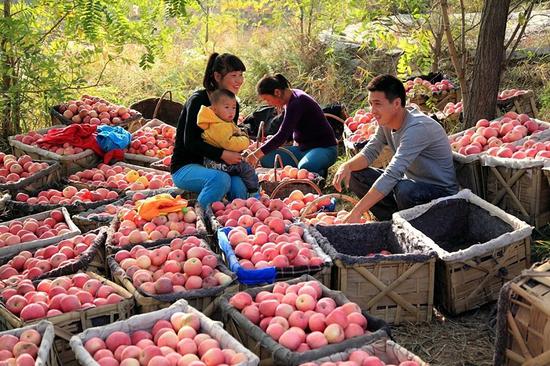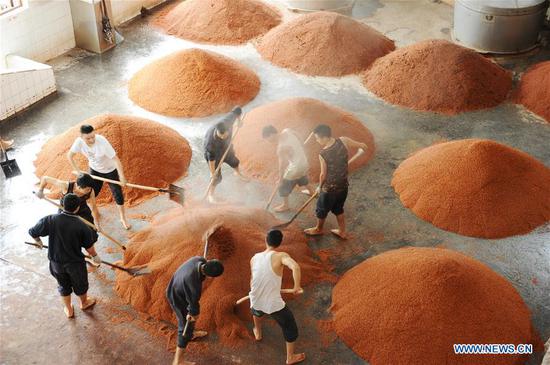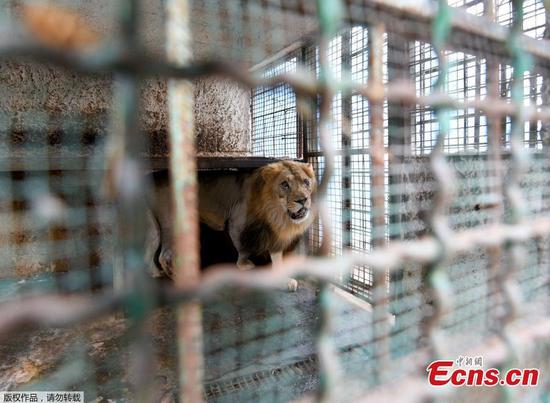
Over the past several decades, Yan'an, Shaanxi Province, has developed agriculture to boost incomes and reduce the poverty rate.
The poor population had dropped to 3 percent by the end of last year, cutting the number of people living under the national poverty line to 47,680, down from more than 205,000 in 2014. In the last three years, more than half the local poor have been lifted out of poverty.
People have benefited from the city's aim to boost the development of modern agriculture and build a national demonstration zone. Last year, 18,000 hectares of vegetable greenhouses were built to produce 1.39 million metric tons of vegetables, earning 3.86 billion yuan ($559 million), according to local figures.
In Shangbiangou village in suburban Yan'an, Han Jinyuan went through hard times when her son was in college and her daughter was suffering from a long-term illness. The local government built greenhouses and rented them out to villagers, with poor families getting first choice.
The 48-year-old mother now rents a 12,000-square-meter greenhouse for 12,000 yuan a year, which can cultivate more than 13,000 sweet melon seedlings. She spends another 13,000 yuan on fertilizer, plastic covers and other items.
In October, Han was busy growing the seedlings, which are expected to yield about 2 metric tons of melons.
"The melons sell for about 50 yuan per kilogram in supermarkets in downtown areas," Han said, adding that she can harvest two crops in a year.
The village used to be remote, but residents were moved to the current location, which has a highway. Village Party chief Lei Xicheng said girls would not marry young men in his village even if they offered 50,000 yuan as a betrothal gift.
"Our homes were too secluded from the outside world and no one would come to us before the relocation," Lei said. "Now we don't have that trouble. It has become easier for our young men to get married, so long as they work hard running the greenhouses."
Growing vegetables is one of several ways to increase incomes for the poor. Others have started to grow apples with government assistance.
Last year, 9,200 hectares of new apple orchards were established in Yan'an, bringing the overall acreage up to 240,000 hectares. The yield of 3.32 million metric tons accounted for one-third of Shaanxi's production and one-ninth of China's yield in 2017.
In Nangou village, in the suburban district of Ansai, Zhao Yongqian, a 52-year-old farmer, was harvesting apples from trees grown on mountainside terraces.
Zhao's family has nearly 2 hectares of apple farms, which was expected to produce about 6,000 kilograms of ripe apples this year.
"The price is good this year - 7 to 8 yuan per kilogram, and I can sell these apples for about 42,000 yuan this year. I can make a net income of nearly 30,000 yuan," he said as he packed apples into boxes that will be delivered to wholesale buyers.
His neighbor Hu Zhenghong, 58, has 1.2 hectares of apple trees. "In the past, I didn't even know the taste of apples because of the dry weather of the Loess Plateau," she said. "Now I am thinking about how to grow tasty apples and sell them at a good price."
The district government dispatches technical professionals to train farmers in growing fruits and vegetables. Villagers in Nangou were mentored in training courses on how to find and preserve water on mountains and keeping insects away from the apples.
Wang Changbin, deputy director of Yan'an Bureau of Poverty Relief, said the government plays a vital role in the local poverty relief campaign. He said the city will have no one living under the poverty line by the end of this year, but it's a long-term project to help locals get a better life.


















































